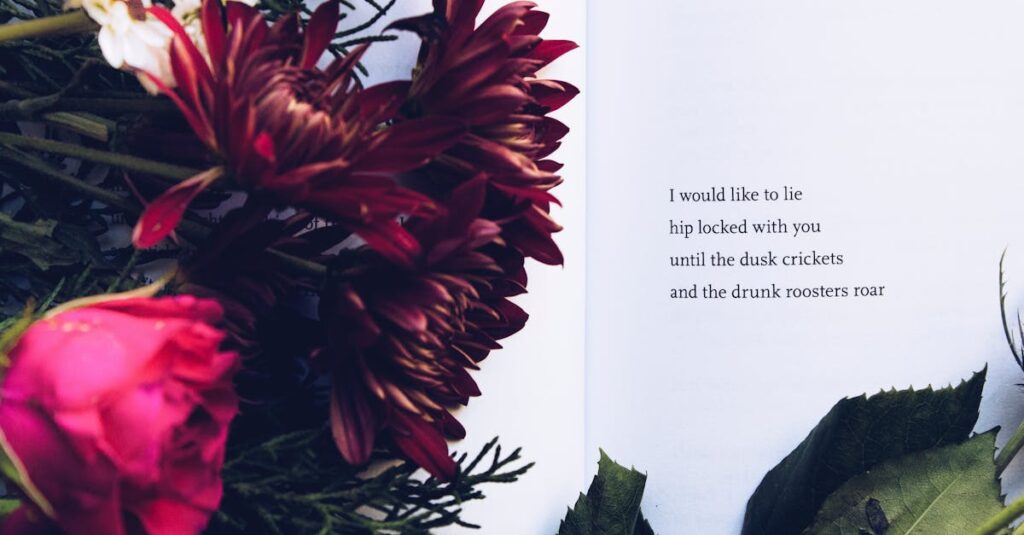
When it comes to love, few things capture the heart quite like poetry. The art of weaving words into a heartfelt expression of deep emotions has existed for centuries, with poets using their craft to explore the many facets of love — from passionate devotion to heart-wrenching heartbreak. In this article, we’ll explore some of the most romantic poems ever written, and reflect on how they continue to resonate with us in their timeless beauty.
1. “Sonnet 18” by William Shakespeare
“Shall I compare thee to a summer’s day? Thou art more lovely and more temperate.”
William Shakespeare’s Sonnet 18 is arguably one of the most famous romantic poems of all time. With its lush imagery and timeless declaration of love, Shakespeare masterfully immortalizes his beloved by comparing them to the natural beauty of a summer day. The poem’s beauty lies not just in its perfect rhyme, but in its ability to transcend time itself. What makes it so romantic is its promise of eternal love, suggesting that love, like the poem itself, will last forever — far longer than even the most fleeting of seasons.
Personal Reflection:
This sonnet speaks to me because of its gentle yet powerful sentiment — that love can outlast time and space. It reminds me of how we often seek to preserve our most cherished moments, and how love, when shared authentically, transcends the boundaries of life.
2. “How Do I Love Thee?” by Elizabeth Barrett Browning
“How do I love thee? Let me count the ways. I love thee to the depth and breadth and height my soul can reach.”
Elizabeth Barrett Browning’s Sonnet 43 from Sonnets from the Portuguese is a magnificent declaration of love. This poem speaks to the boundless nature of love, articulating the intensity and depth of the speaker’s feelings. Each line magnifies a new way of loving, from physical to spiritual, illustrating the limitless qualities of love.
Personal Reflection:
This poem holds a special place in my heart because it captures the multifaceted nature of love. Browning doesn’t just describe love as a feeling, but as a vast and complex experience that can’t easily be captured in mere words. It makes me think about how love transforms us, expanding the boundaries of what we thought we were capable of.
3. “The Raven” by Edgar Allan Poe
“Open here I flung the shutter, when, with many a flirt and flutter, / In there stepped a stately Raven of the saintly days of yore.”
Though The Raven is often categorized as a poem of melancholy and loss, it is undeniably romantic in its depiction of longing and despair. The narrator’s intense desire for his lost love, Lenore, haunts the poem. The Raven, which perches on his door, symbolizes the permanence of death and the torment of unrequited love. The powerful imagery and emotional weight create a mood that resonates deeply with anyone who has experienced heartache.
Personal Reflection:
Poe’s The Raven teaches us about the darker side of love — the kind that grips us with such force that we can’t let go, even when we know it’s beyond our reach. It’s a reminder of the passionate intensity that love can carry, even when it’s entwined with loss and yearning. The haunting beauty of this poem still feels relevant in today’s world of fleeting connections and fleeting passions.
4. “i carry your heart with me” by E.E. Cummings
“i carry your heart with me(i carry it in / my heart)”
E.E. Cummings’ poem i carry your heart with me is a tender and personal declaration of love. It speaks of the profound connection between two people, where love becomes an inseparable part of the self. Cummings’ unconventional structure and lowercase writing add to the intimacy of the piece, creating an almost secret, personal tone as if the poet is sharing an intimate thought with only the reader.
Personal Reflection:
What makes this poem so romantic is its simplicity and sincerity. There’s something incredibly beautiful about the idea of love being so intertwined with one’s being that it’s carried with you, constantly present and unbreakable. This poem often reminds me of the deeper, soul-binding connection that love can form between two people, something that transcends distance and time.
5. “When You Are Old” by William Butler Yeats
“When you are old and grey and full of sleep, / And nodding by the fire, take down this book.”
Yeats’ When You Are Old is a bittersweet reflection on the passage of time and the enduring nature of love. Written for the poet’s beloved, Maud Gonne, the poem speaks to the inevitability of aging and the fading of youthful beauty, yet it celebrates the constancy of true love. The speaker urges his beloved to remember the deeper, enduring love he has for her — the love that surpasses mere physical attraction.
Personal Reflection:
This poem resonates deeply with me because it reflects the idea that love is not just based on physical beauty but is rooted in a deeper emotional and spiritual connection. In a world where superficiality often takes precedence, Yeats reminds us that true love sees beyond the surface, embracing a love that remains, even as time passes.
6. “A Red, Red Rose” by Robert Burns
“O my Luve’s like a red, red rose / That’s newly sprung in June.”
Burns’ A Red, Red Rose is a timeless classic that uses nature to depict the speaker’s undying love for his beloved. The red rose, often a symbol of love, becomes the central metaphor for the speaker’s feelings, while the repeated imagery of enduring love reinforces the strength of his devotion.
Personal Reflection:
This poem feels like a celebration of love in its purest form — uncomplicated, passionate, and sincere. The metaphor of the red rose resonates because it captures how love can feel fresh and beautiful, even as time moves forward. It makes me reflect on how love can stay vibrant and strong, no matter how much time passes.
7. “Annabel Lee” by Edgar Allan Poe
“But we loved with a love that was more than love— / I and my Annabel Lee.”
Another work by Poe, Annabel Lee, speaks of a love so deep that it transcends even death. The poem describes the tragic death of Annabel Lee and the narrator’s unrelenting devotion to her, even after her passing. It’s a poignant reminder that love can be so powerful that it outlives the physical body, continuing to resonate even in the face of grief and loss.
Personal Reflection:
Annabel Lee is hauntingly romantic in its depiction of an all-consuming love. I find it beautiful in how it refuses to let go, emphasizing that love, in its truest form, is eternal and unyielding. It reminds me that love can remain with us, shaping our lives long after someone is gone.
Conclusion: Why Romantic Poetry Still Resonates Today
Romantic poems speak to the deepest corners of the heart, reminding us of the beauty, complexity, and sometimes, the pain of love. From Shakespeare’s immortal sonnets to Cummings’ intimate verses, these poems transcend their original time and place, speaking to universal emotions that continue to resonate today.
As we reflect on these iconic pieces of romantic literature, it becomes clear why poetry remains one of the most enduring ways to express love. Love, in all its forms, continues to be a force that drives us — it challenges us, changes us, and connects us. The most romantic poems ever written do more than just capture the beauty of love; they remind us of love’s power to shape our lives, to challenge boundaries, and to stay with us, long after the moment has passed.

